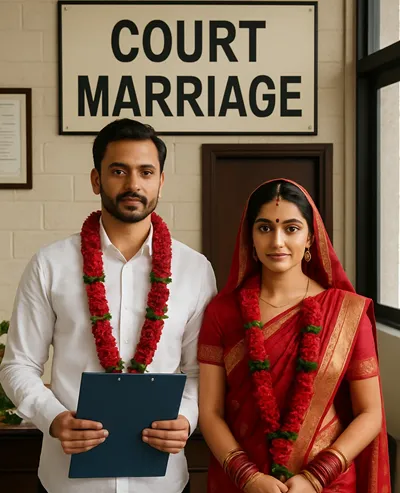Court Marriage Guide: Process, Fees and FAQs

What Is a Court Marriage
- Court marriage in India happens under the Special Marriage Act, 1954 — a secular law that allows any two consenting adults (21 years for men, 18 for women) to marry, irrespective of religion, caste, or faith. It skips the priest, pandit, or maulvi — and replaces rituals with registration, signatures, and legal protection. Why choose it: Interfaith or inter-caste couples
- Those facing family or social pressure
- NRIs or foreign nationals
- Widowed, divorced, or second-time marriages
- Anyone preferring a simple, no-drama ceremony
- Court marriage is your legal shield against forced opposition, dowry demands, and social interference.
Documents You'll Need
| Purpose | Documents Required | What People Forget |
|---|---|---|
| Identity Proof | Aadhaar, Passport, or Voter ID | Names must match across documents |
| Age Proof | Birth Certificate, 10th Marksheet, or Passport | Bring originals + photocopies |
| Address Proof | Utility Bill, Rent Agreement, or Bank Statement | Should show residence of 30+ days |
| Photos | 4–6 recent passport-size photos | Keep digital copies too |
| Marital Status | Affidavit of being single/divorced/widowed | Divorce decree or death certificate, if applicable |
| For Foreign Nationals | Valid visa + passport, NOC from embassy, proof of stay 30+ days | Police verification may be needed |
Step-by-Step Process
- Notice of Intended Marriage
- Submit it to the Marriage Registrar of the district where either partner has lived for at least 30 days.
- Tip: Keep residence proof handy; officers often cross-check.
- Publication of Notice
The notice is displayed publicly at the SDM office. Anyone with a legal objection (not parental drama) has 30 days to respond. - Handling Objections (If Any)
If objections arise, the officer must decide within 30 days. Myth-buster: Families can't block marriage unless there's fraud, coercion, or underage issues. - Declaration and Ceremony
- After the 30-day period, the couple and three witnesses sign a declaration. No rituals. No fuss. Just signatures and vows if you like.
- Pro Tip: Choose calm, neutral witnesses — not anyone controversial.
- Marriage Certificate
Issued on the spot or within a few days — legally valid across India and abroad.
Facing threats?
- File a police complaint or approach the District Magistrate for safe-house protection.
- You can also file a writ petition in the High Court seeking police protection.
Court Marriage Fees (State-Wise Examples)
| State/UT | Approximate Fee |
|---|---|
| Delhi | ₹500 – ₹1,500 |
| Maharashtra | ₹1,000 |
| Uttar Pradesh | ₹700 – ₹1,200 |
| Uttarakhand (Dehradun) | ₹500 – ₹1,000 |
| Tamil Nadu | ₹1,000 + stamp duty |
| Karnataka | ₹1,000 |
| Gujarat | ₹500 |
| West Bengal | ₹1,000 |
| Kerala | ₹800 – ₹1,200 |
(Check your local SDM or district registrar office website for current rates.)
Practical FAQs – Court Marriage
-
1. Can I marry without telling my parents?
-
Yes. No parental consent is required if both are adults.
-
2. Can we apply from different cities?
-
No. One partner must reside 30+ days in the registrar's district.
-
3. Can marriage happen in a weekend?
-
No. The 30-day notice period is legally mandatory.
-
4. Is the certificate valid abroad?
-
Yes. Get it apostilled by the Ministry of External Affairs for use overseas.
-
5. Is religious conversion required?
-
No. The Special Marriage Act is secular — no conversion needed.
-
6. Can we skip the 30-day notice?
-
No. It's mandatory. Urgent marriages can only happen through Arya Samaj or the religious route, not via court.
-
7. Can interfaith couples marry under this Act?
-
That's exactly what it's for — no conversion, no rituals.
-
8. Can Hindus also do court marriages?
-
Yes. It's open to everyone, regardless of religion.
-
9. Who can be a witness?
-
Any three adults (friends, colleagues, neighbours) with valid ID and address proof.
-
10. Can one witness sign for both partners?
-
No. Three distinct witnesses must sign in person.
-
11. How can NRIs marry in court?
-
NRI must show a valid visa, an NOC from the embassy, and 30-day residence proof in India.
-
12. Can I change my name after marriage?
-
Yes — by filing an affidavit and publishing it in the Gazette of India.
-
13. Do I automatically get my spouse's surname?
-
No. You can keep your maiden name legally.
-
14. Can we apply in a different state?
-
Yes, if one partner shows 30+ days' residence proof in that state.
-
15. What if the registrar refuses?
-
File a complaint with the District Magistrate or escalate through RTI or High Court.
-
16. Is Aadhaar mandatory?
-
No, but it's the easiest to use. Passport or voter ID is also accepted.
-
17. What if I changed religion recently?
-
Submit your conversion certificate or affidavit and ensure your documents reflect new details.
-
18. Is a lawyer necessary?
-
Not legally — but highly recommended if:
- Facing family threats
- Interfaith couple
- Foreign partner involved
Add new comment